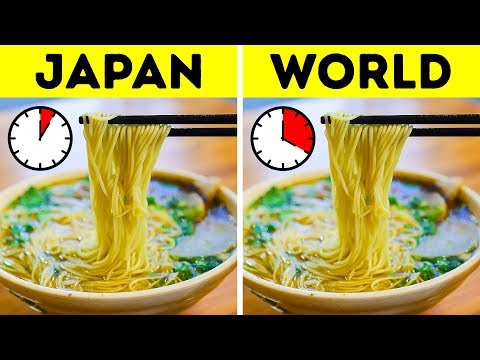
Why are Japanese people so thin? What do people eat in Japan? While the rest of the world is seeing anywhere from 15 to over 30% of its population severely overweight, Japan has managed to keep that number at just 3.6%. When it comes to health tips, it’s better to turn to the country with the longest life expectancy and one of the lowest obesity rates on the planet. If you’re ready to find out how the Japanese manage to stay so effortlessly thin, keep our new video!
In Japan, they usually stick to 3 wholesome meals a day that don’t leave them hungry or dealing with sudden cravings. Those who do snack keep it in small quantities and with a lot of moderation.
Also, the secret to Japan’s success begins with their diet, which is pretty carb-heavy and low in saturated fats. Their main dishes of choice include vegetables, grains, fish, and meat. Dairy products and fruits are consumed in moderation. They tend to stay away from foods with excessive amounts of salt and sugar, like burgers and soda.
TIMESTAMPS:
Diet 0:50
No snacking 1:39
Fast food 2:02
Eating on time 2:58
Exercise for kids 3:44
Portion sizes 4:27
A great public transportation system 5:20
Tea time 6:15
Dinnerware 7:25
Food as an experience 8:09
#japan #japanesediet #japanesefood
Music by Epidemic Sound
SUMMARY:
– The secret to Japan’s success begins with their diet, which is pretty carb-heavy and low in saturated fats. Their main dishes of choice include vegetables, grains, fish, and meat.
– Just like the rest of the world, a lot of Japanese people have a hectic schedule that doesn’t leave a lot of time or opportunity to prepare a home-cooked meal. In that case, they can turn to their version of fast food, which is usually a lot healthier and resembles home-style cooking.
– Most Japanese people have very regulated meal times. They eat 3 filling meals a day, with breakfast usually happening between 8 and 9am, lunch from 12 to 1pm, and dinner between 6 and 8pm.
– It’s a lot more common for Japanese children to walk or cycle to school. Of course, other countries have a lot of reasons why it might not be efficient or safe for kids to hoof it to class.
– Portion sizes have been on a steep rise in the last 20 years throughout the world. For example, countries like Australia, Canada, Germany, the U.S., and the U.K. have much larger fast food portions than Japan.
– Separate bicycle lanes and plenty of safe areas for pedestrians are common sites in Japan. This allows the Japanese to naturally burn calories as they commute to and from work or school every day.
– Tea, especially the green variety, is the number one beverage in Japan. Green tea has been praised for having a ton of major health benefits, like increasing metabolism, burning fat, fighting anxiety, and reducing the risk of cardiovascular disease, to name a few.
– The practice of using chopsticks also helps in weight management, since they make you eat more slowly and in smaller bites. This slow process of eating helps people catch when they’re feeling full and avoid eating too much. The fact that food is served on a bunch of plates also slows down the process.
– The number one way that the Japanese stay thin has to do with removing distractions and being mindful about the process of food consumption. Eating in Japan is treated with respect.
Subscribe to Bright Side :
—————————————————————————————-
Our Social Media:
Facebook:
Instagram:
5-Minute Crafts Youtube:
—————————————————————————————-
For more videos and articles visit:
/




